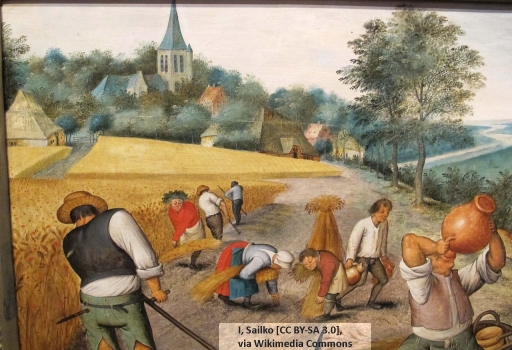Land, labour and food
Land, labour and food
… and the greenbelt

Let’s build on the polluted greenbelt
A common argument in favour of greenbelt policy is that land is required for food production with a rising world population. However, Professor Cheshire points out horsey culture and golf courses on greenbelt land do not produce food. There is also the issue of food wastage and the destruction of food-value with the conversion of economically ‘inferior’ foods to ‘superior’ foods as discussed in It’s the poor that starve. Another post Pollution in the countryside discussed the destructive effects of modern farming methods on medium term soil fertility.
The countryside is not as clean and green as it seems. In Polluting the Countryside, I noted the large carbon footprint of modern non-organic agriculture, particularly the methane emitted by ruminants (cows, sheep, goats &etc.) and the use of nitrogen compounds derived from the energy intensive Harber Bosh process. I also discussed the carbon footprint of “modern”, non-organic, food production but there are other unwelcome impacts. Three of these:
- Loss of soil fertility
- Insectageddon
- The nitrate time bomb
but
Houses, with gardens and public open spaces, can provide favorable habitats for wildlife species, while polluting golf courses and farms are allowed to occupy land when much needed houses are denied.
We need a better way of producing food.
In an age when robots are causing the value of labour to fall, we should be using more labour. This is because the the world (especially the richest 10%) must consume less – so we must produce less:
If the world produces less and aims for full employment, each worker must produce less and be less productive. We must train our economists to accept this and rework their theories for the new reality.
Imagine (© John Lennon 1971) we reach “a point at which all the necessaries and comforts of life shall be produced without human labour” (© Robert Owen circa 1840). Would we abandon work altogether?
Elizabeth and Paul Kaiser use no-till, labour intensive methods on their Singing Frogs Farm. Although the presentation below measures production in dollars rather than ‘food value’, it is inspiring to see how much food can be produced on a small amount of land with high levels of labour. This increases – without damaging soil fertility or the global environment:
Singing Frogs Far presents an example of a better way of food production, local food with local employment.
Their claim: “There is no alternative”
It’s difficult to find research which gives guidelines for the quantity of food that can be produced on small areas of land, when serious non-industrial efforts are made. In Food and permaculture, David Blume made the surprising claim that ‘Two acres produced enough food for 300 people’. He argues that the industrialised monocultures of modern farming use less labour. These have poor yields but are favoured by corporations:
The argument that we can’t produce enough ecologically is, at its source, promoted by corporations who benefit from a view of scarcity and limited resources which they control. Their claim is “There Is No Alternative”. Right, and the wizard says, “Pay no attention to the man behind the curtain!”.
…and I’ve just remembered…
Pëtr Kropotkin (1912)
There is more comprehensive stuff from Pëtr Kropotkin back in 1912 Fields, Factories and Workshops or Industry Combined with Agriculture and Brain Work with Manual Work
The fields of Britain are starved of human labour.
The cause of this general downward movement is self-evident. It is the desertion, the abandonment of the land. Each crop requiring human labour has had its area reduced; and almost one-half of the agricultural labourers have been sent away since 1861 to reinforce the ranks of the unemployed in the cities,[40] so that far from being over-populated, the fields of Britain are starved of human labour, as James Caird used to say. The British nation does not work on her soil; she is prevented from doing so; and the would-be economists complain that the soil will not nourish its inhabitants!
See also
- The Green Settlement Handbook
- Food: Scientists vs amateurs
- Car-free estates of wooden prefabs with inbuilt market gardens
Tweets
TrackBack URL :
